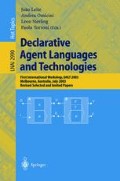Abstract
In this paper we present a brief overview of the ΦLOG project, aimed at the development of a domain specific framework for the rapid prototyping of applications in evolutionary biology. This includes the development of a domain specific language, called ΦLOG, and an agent-based implementation for the monitoring and execution of ΦLOG’s programs. A ΦLOG program – representing an intended application from an evolutionary biologist – is a specification of what to do to achieve her/his goal. The execution and monitoring component of our system will automatically figure out how to do it. We achieve that by viewing the available bioinformatic tools and data repositories as web services and casting the problem of execution of a sequence of bioinformatic services (possibly with loops, branches, and conditionals, specified by biologists) as the web services composition problem.
Access this chapter
Tax calculation will be finalised at checkout
Purchases are for personal use only
Preview
Unable to display preview. Download preview PDF.
References
van Deursen, A., Klint, P., Visser, J.: Domain-Specific Languages: an Annotated Bibliography (2000), http://www.cwi.nl/~arie/papers/dslbib
Maddison, D.R., Swofford, D., Maddison, W.: NEXUS: An Extensible File Format for Systematic Information. Syst. Biol. 464, 590–621 (1997)
Gonner, G., Hallet, M.: Darwin 2.0. Technical report, ETH-Zurich (2000)
Baker, P., Brass, A., Bechoofer, S., Goble, C., Paton, N., Stevens, R.: TAMBIS – Transparent Access to Multiple Bioinformatics Information Sources. In: Proceedings of the International Conference on Intelligent Systems for Molecular Biology (1998)
Maddison, D.R., Maddison, W.: Mesquite: A Modular System for Evolutionary Analysi. Technical report, U. of Arizona (2001)
Standardizing Biological Data Interchange Through Web Services (2001), omnigene.sourceforge.net
Swofford, D.L., Olsen, G.J., Waddell, P.J., Hillis, D.M.: Phylogenetic inference. In: Molecular Systematics, pp. 407–514. Sinauer Associates, Sunderland (1996)
Schmidt, D.: Denotational Semantics: a Methodology for Language Development. W.C. Brown Publishers (1986)
Levesque, H., Reiter, R., Lesperance, Y., Lin, F., Scherl, R.: GOLOG: A logic programming language for dynamic domains. Journal of Logic Programming 31, 59–84 (1997)
Pontelli, E., Ranjan, D., Milligan, B., Gupta, G.: Design and Implementation of a Domain Specific Language for Phylogenetic Inference. Journal of Bioinformatics and Computational Biology 1, 1–29 (2003)
DAML-S Coalition: Ankolekar, A., Burstein, M., Hobbs, J., Lassila, O., Martin, D., McIlraith, S., Narayanan, S., Paolucci, M., Payne, T., Sycara, K., Zeng, H.: DAML-S: Semantic markup for Web services. In: Proc. International Semantic Web Working Symposium (SWWS), pp. 411–430 (2001)
Stevens, R.: Bio-Ontology Reference Collection, cs.man.ac.uk/~stevens/onto-publications.html
Bio-Ontologies Consortium, http://www.bioontology.org
Cheyer, A., Martin, D.: The Open Agent Architecture. Journal of Autonomous Agents and Multi-Agent Systems 4, 143–148 (2001)
McIlraith, S., Son, T.: Adapting golog for composition of semantic web services. In: Proceedings of the Eighth International Conference on Principles of Knowledge Representation and Reasoning (KR 2002), pp. 482–493. Morgan Kaufmann Publisher, San Francisco (2002)
McIlraith, S., Son, T., Zeng, H.: Semantic Web services. IEEE Intelligent Systems (Special Issue on the Semantic Web) 16, 46–53 (2001)
Fowler, J., Perry, B., Nodine, M., Bargmeyer, B.: Agent-Based Semantic Interoperability in InfoSleuth. SIGMOD Record 28(1), 60–67 (1999)
Sycara, K., Paolucci, M., van Velsen, M., Giampapa, J.: The retsina mas infrastructure. In: Autonomous Agents and MAS (2003) (to appear)
Leite, J., Alferes, J., Pereira, L.: MINERVA: a Dynamic Logic Programeing Agent Architecture. In: Meyer, J.-J.C., Tambe, M. (eds.) ATAL 2001. LNCS (LNAI), vol. 2333, p. 141. Springer, Heidelberg (2002)
Gupta, G., Pontelli, E.: Specification, Implementation, and Verification of Domain Specific Languages: a Logic Programming-based Approach. In: Computational Logic: from Logic Programming into the Future, Springer, Heidelberg (2001)
Reiter, R.: KNOWLEDGE IN ACTION: Logical Foundations for Describing and Implementing Dynamical Systems. MIT Press, Cambridge (2001)
Jones, N.: Introduction to Partial Evaluation. ACM Computing Survey 28, 480–503 (1996)
Sahlin, D.: The mixtus approach to the automatic evaluation of full prolog. In: Proceedings of the North American Conference on Logic Programming, pp. 377–398. MIT Press, Cambridge (1990)
Niemela, I., Simons, P.: Smodels - An Implementation of the Stable Model and Well-Founded Semantics for Normal LP. In: Logic Programming and Nonmonotonic Reasoning, pp. 421–430. Springer, Heidelberg (1997)
De Giacomo, G., Lespérance, Y., Levesque, H.: ConGolog, a concurrent programming language based on the situation calculus. Artificial Intelligence 121, 109–169 (2000)
Son, T., Baral, C., McIlraith, S.: Domain dependent knowledge in planning - an answer set planning approach. In: Proceedings of the 6th International Conference on Logic Programming and NonMonotonic Reasoning, Vienna, pp. 226–239 (2001)
Son, T., Pontelli, E.: Reasoning about actions in prioritized default theory. In: Flesca, S., Greco, S., Leone, N., Ianni, G. (eds.) JELIA 2002. LNCS (LNAI), vol. 2424, pp. 369–381. Springer, Heidelberg (2002)
Lifschitz, V.: Answer set planning. In: International Conference on Logic Programming, pp. 23–37 (1999)
Bentley, J.: Programming pearls: Little languages. Communications of the ACM 29, 711–721 (1986)
Author information
Authors and Affiliations
Editor information
Editors and Affiliations
Rights and permissions
Copyright information
© 2004 Springer-Verlag Berlin Heidelberg
About this paper
Cite this paper
Son, T.C., Pontelli, E., Ranjan, D., Milligan, B., Gupta, G. (2004). An Agent-Based Domain Specific Framework for Rapid Prototyping of Applications in Evolutionary Biology. In: Leite, J., Omicini, A., Sterling, L., Torroni, P. (eds) Declarative Agent Languages and Technologies. DALT 2003. Lecture Notes in Computer Science(), vol 2990. Springer, Berlin, Heidelberg. https://doi.org/10.1007/978-3-540-25932-9_5
Download citation
DOI: https://doi.org/10.1007/978-3-540-25932-9_5
Publisher Name: Springer, Berlin, Heidelberg
Print ISBN: 978-3-540-22124-1
Online ISBN: 978-3-540-25932-9
eBook Packages: Springer Book Archive

